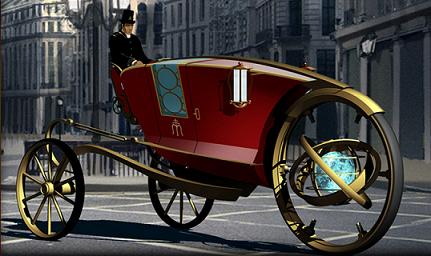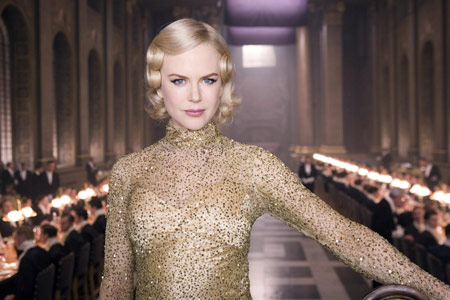Well, it’s no secret that I was not a big fan of the movie “The Golden Compass” even before it came out. I knew that it was derived from a book of the same name, which was part of a trilogy written by Philip Pullman, a self-described atheist. There was also the fact that the series is known as His Dark Materials trilogy, and that there was a running thread in the books that was anti-religious. I don’t have a problem with that, but I did have a problem with God being terminated by the series’ young protagonists in book 3. Pretty intense stuff for a children’s series.
But there’s a couple of things that merit a revisit to this movie. One is the fact that I was a big fan of “The Chronicles of Narnia” which is a series that is an unabashedly pro-Christian allegory1. I did not want to favor one point of view without giving a chance to its opposite. There was the fact that I don’t want to dismiss an entire series based on hearsay. Finally, there’s the fact that Roger Ebert had given the movie 4 stars. I had to check this movie out.
I recently had the opportunity to view the DVD of the movie recently, and I can see why Mr. Ebert admired its production values; they are exquisite.

The concepts were brilliantly illustrated on the screen, and as Roger writes “As a visual experience, it is superb.”

But I cannot recommend the movie. As beautiful as it is to behold, it failed its first test when one of my kids asked me when the movie was going to be over. This is the equivalent of the dreaded looking-at-your-watch syndrome while watching a movie at the theatre. Now, I’ve been in movies that are slow moving and require extreme patience, so a measured pace has never bothered me. My issues with the movie lie elsewhere.
Spoilers follow:
It had some brilliant touches: giant polar bears engaging in combat dressed in ritual battle gear, a cowboy balloonist transplanted from the American plains to the magical lands of the Compass (hmmm…. wasn’t there another balloon that was once blown to the land of Oz??), a duel between free thought and the regimentation of the evil Magisterium.
The good guys were brave and good looking, the evil guys looked appropriately Catholic (I believe there is some sort of rule about this, in Hollywood). And the bears kicked butt; I was really impressed with the way in which the movie explored all of the different worlds of the Compass. But perhaps there was too much there; did we really need to have the society of Witches be included in the film? They seemed tacked-on just to use up a special-effects budget that was considerable. The mystery behind their culture remained after the film was over. The big battle between the gypsies, er, Gypsians and the evil Cossacks was superfluous; the real duel between Good and Evil had already happened when the polar bear protagonist reclaimed his kingdom and his reputation. And did I mention that the film had Cossacks? They really only showed up to provide a multitude for the CGI-battle scene.
And one of the nicer touches in the film, the visible manifestation of the soul, or Daemon2, was faintly disturbing. Why? Because it rhymes with the word “demon” and it was disquieting to my children, the film’s intended audience. But I admire its usage; it shows that the author did not wish to conceal the thrust of his writings.
And the writing is good and must be defended. The author has a point of view and does not mind using an entertaining medium to posit it. But my big problem is that the film excised all of the objectionable material from the books in order to sell to wider audiences. In doing that, it is concealing the intention of the original material. The Narnia writings are unabashedly Christian at heart, and the publicity did not shy away from emphasizing this3. But Golden Compass film kept its origins secret; it was up to the Internet community and special interest groups to make it known. This is my strongest objection, and the reason I did not originally seek to view the film.
But having come across the film by circumstance, I can now report that it is worth viewing, for its production values. However, if you decide to read the books on which it is based, you may want to keep in mind their primary intention. I would not let my kids read the books until after I do so myself; it could be a good starting point for a discussion about God, belief and the role of authority, whether good or bad. But I would not give the Golden Compass books/DVD gift-pack to a child, unless you know what’s inside.

- see my previous article http://www.crackteam.org/2006/04/23/its-obvious-episode-1-narnia-for-dummies/ [↩]
- the Greek word denoted an inferior good/evil spirit, and equivalent to the Roman genius. As a stand-in for soul or consciousness, it is definitely workable. [↩]
- Chronicles of Narnia was sold extensively to the church crowds and Christian circles. There was never a question where the focus lies, in the story [↩]

Weird, I read the books and enjoyed the movie. Of course, I believe that Nicole Kidman should be in every movie. I would watch a teletubbies movie if she was in it.
Sure, they took out some of the pointless anti-church ramblings that the loon of an author thought were critical to the story, and honestly, it improved the movie. Had they left them in place, it would have only muddled the adventure, the bonding, the drama, really everything great about the story. I guess I am not a purist when it comes to translating art between different media. If anything, this movie demonstrates why it important to make these changes. Had they been 100% true to the original book, the movie would have been 7 hours long and boring as hell. The whole point of a film adaptation is to do just that, recognize what is good in a book or play and adapt it to the big screen in a way that maximizes what is entertaining or enlightening to the audience. If someone was to turn this story into a play, they would have to chop even more of the original works out. If the author doesn’t want that to happen, he needs to retain control when he sells the rights to his works.
Just to be clear though, I am not a huge fan of the church and the way it handles itself when it’s representatives screw up. Still, I found the anti-church theme to these books to be pointless and distracting. It would have been the same if when I saw George Michael in concert last week if he had changed the words of some of his songs and spent a few minutes talking to the audience about how many security cameras they have in England. Don’t care, not interested, get back to singing and prancing around the stage. Sure, as an artist it is his right to express himself as he sees fit, but the thing about artists is lots of times they are actually not very good decision makers, rarely capable of logical thought, and driven by emotions and feelings, which is why they are soooo much better at the whole creative vision than your average engineer (and also why they usually vote democrat).
I agree with many of your points though, and strongly recommend that parent get involved with raising their children. I read lots of screwed up stuff when I was a kid because, well, my folks where not the reading type, so they just didn’t get involved. Had they decided that I was too young to read Stranger in a Strange Land at like age 10, I probably would not have been worse off, but then again, I probably wouldn’t have decided to be a rocket scientist either, and instead of typing this on my kick ass new gaming rig while sitting in a massage chair on a Sunday morning, I would be at church…..
Thanks, MC. If I was sitting on the massage chair while watching Nicole Kidman in all of her blonde 70mm glory, I would have given this film an extra star. She was definitely good in her role, as were all of the other actors. My problem with the film is that it feels pasted together. I don’t know if this is emblematic of the book or if it is just a product of poor translation to a different medium.
As I mentioned earlier, the Narnia world is also pasted together in a way that even J.R.R Tolkien (a contemporary of Narnia’s C.S.Lewis) found objectionable. What were Roman nymphs and fauns doing in the same book as Father Christmas? Pretty strange stuff. But C.S.Lewis (and the Narnia film-makers) was able to turn the mish-mash and get some greater truth (and exciting visuals) out of it. Golden Compass has the visuals but does not touch that higher truth. Perhaps that is reserved for later books in the trilogy; if they see the light of day in film, we may be able to judge for ourselves.
For now, I have added a shot of Nicole Kidman as Mrs. Coulter to the end of the article. You definitely have a point there.